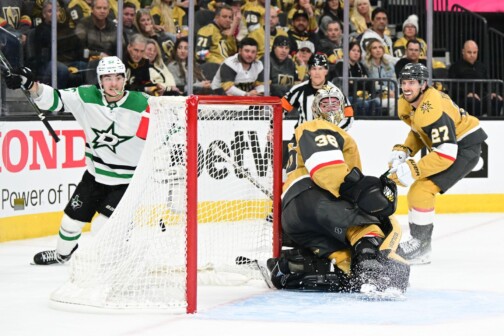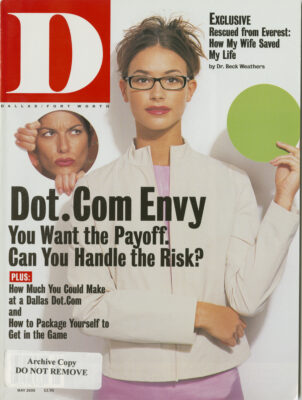ANDY MOOG RETIRED FROM the National Hockey League in 1998, after a career that ranks him among the finest goalies ever to play the sport. Moog’s name is engraved on the Stanley Cup in three places, a witness to the years he spent with the Edmonton Oilers, where he was a teammate of Wayne Gretzky.
Today, Moog has gone back to the minor leagues, as the principal owner and president of the Fort Worth Brahmas of the Western Professional Hockey League.
“When I initially invested in the Brahmas, I came in as a minority partner,” Moog explains. “My family was living happily in Coppell. My three daughters were in school, and I wanted to put money into some kind of local enterprise. My intent was to experience the ownership side of the hockey business and see whether I might want to put money in an NHL franchise at a later time.”
When Moog and his partners bought the Brahmas in 1997, theirs was not simply a high-risk, highreturn investment; it was a gamble that bordered upon madness. They violated every rule of the sports entertainment industry, starting with Rule No. 1:
Never place a minor league operation in a marketplace already crowded with entrenched major league sports franchises.
The Brahmas entered a sports entertainment market dominated by the Cowboys, Rangers, Mavericks, and Stars. Not only are the big four potent draws by themselves, but they also bring to town such major league franchises as the Washington Redskins, the New York Yankees, the Los Angeles Lakers, and the Detroit Red Wings. The Brahmas play a schedule against 15 teams that include (he Alexandria Warthogs, the El Paso Buzzards, the Odessa Jackalopes, the Shreveport Mud Bugs, and the Tupelo T-Rex.
Rule No. 2: Never set up operations in an inferior facility-or two inferior facilities.
While the Stars and Mavericks await the completion of the S240 million-dollar American Airlines Center, the Brahmas play their games in the Fort Worth Convention Center, a second-rate, rock conI cert venue hampered by terrible sight lines , and the Will Rogers Coliseum, a rodeo arena I that reeks of smoke and cows.
Andy Moog’s folly also violated Rule No. 3, one so obvious thai no one has ever bothered to write it down:
Never put a minor league hockey franchise in a Texas town that already has one.
Fort Worth already had the Fire, the defending champions of the Centra] Hockey League, a rival minor league opération. It is hard to imagine, even in Canada, ice thick enough to support two hockey teams in a small market.
Not long after Moog invested in the Brahmas, the league asked him to become the principal owner of the team. The Brahmas were losing money. Moog acted quickly. Among his moves, he worked to relocate the rival Fort Worth Fire to Cincinnati. That helped. “Now we contro all of the prime home playing dates,” he says. For the entire regular season, we play only one game where school is scheduled the following morning.”
Moog, the ex-NHL All-Star, seemed anything bill stressed on a January Sunday as he : watched his team play a road game at the Travis County Expo Center-home of the Austin Ice Bats, The pre-game festivities consisted of a lone figure skater, decked out in a bat costume, winging around the ice to the accompaniment of a public address announcer who warned fans not to hurl dangerous objects onto the ice. ’’If you do,” he threatened, “you will be locked in a room and forced to listen to Ricky Martin.”
“Being in Fort Worth sets us apart from the rest of the league,” says Moog. a man who has always articulated his beliefs with care. in contrast to the toothless, fists-flying image of professional hockey players. “The popularity of the Stars helps us to a large extent. But when you compare the ad rales for, say, radio advertising in this market as compared to Odessa and places like that, then that’s where our challenge lies.”
The Brahmas presently average about 3.700 paying customers per game. But immediately following a three-week road trip in January (the Brahmas had to leave town for the duration of the Fort Worth Rodeo), the Brahmas drew 6.600 paying fans to watch a game against the Lubbock Cotton Kings. Six thousand more turned out to watch the next game against the Lake Charles ice Pirates.
Even with the increasing attendance, the Brahmas rely on penny-pinching to make ends meet. For instance, the entire Western Professional Hockey League-not just the Brahmas-imposes a strict salary cap that limits teams to a payroll of $ 10.000 per week.
Moog made more than thai per game. Ivan Rodriguez makes 10 grand every time lie raises his catcher’s mask to spit. The players, who make up the rosiers of the WPHL, are content to work for fast food wages because they love the game; they love spending the winter in warm sunshine; and they love meeting young women who think that hockey players from Canada and Finland are exotic. Perhaps most important, they play to delay the inevitable-real jobs.
The WPHL was the brainchild of a Canadian. Rick Kozuback. Kozuback thought that hockey franchises in small markets like Monroe. La., and Belton. Texas-places with limited sports entertainment or any other entertainment for that matter-had potential. He was right. Virtually all of his teams thrive. Only two franchises-Waco and Abilene- failed, because, in Moog’s opinion, management did not adhere to the league’s guiding philosophy: “Take care of the nickels. The dollars will take care of themselves.”
Minor league hockey offers hockey fans a cheap ticket. Lower level seats at Dallas Stars’ games start at $75 a pop. After parking, hot dogs, and cold drinks, a family of four can easily spend $500 to attend a single game.
In Fort Worth, four good Brahma* tickets and four soft drinks run $48.
Moog, who industry insiders estimate has put about $250,000 of his own money into the Brahmas, admits thai he has never studied economics, but he likes his Brahmas’ prospects in an ever-expanding market for local sports. “There is a tremendous amount of revenue available in minor league sports,” he says. “The general notion was that the advent of television in the 1950s killed that form of sports entertainment and, of course, seriously impacted other forms of show business, like the movies. But TV is no longer a novelty, and all across North America, minor league sports-particularly baseball and hockey- are thriving. In fact, if you operate your organization, you can scarcely help but succeed.”
Oh, and does Moog miss the glamour, fame. and seven-figure salary, the 100 mile-per-hour slap shots? He responds with a thin smile.
“No.”
Get our weekly recap
Brings new meaning to the phrase Sunday Funday. No spam, ever.
Related Articles

Hockey
What We Saw, What It Felt Like: Stars-Golden Knights, Game 3
A close final score masks a dominant performance.
By Sean Shapiro and David Castillo

Basketball
What We Saw, What It Felt Like: Mavs-Clippers Game 3
Little brother no more.
By Iztok Franko and Mike Piellucci

Local News
In a Friday Shakeup, 97.1 The Freak Changes Formats and Fires Radio Legend Mike Rhyner
Two reports indicate the demise of The Freak and its free-flow talk format, and one of its most legendary voices confirmed he had been fired Friday.


